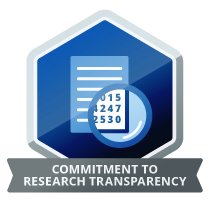Ulrich Schroeders | Psychological Assessment
Longitudinal measurement invariance testing with categorical data
 In a recent paper – Edossa, Schroeders, Weinert, & Artelt, 2018 – we came across the issue of longitudinal measurement invariance testing with categorical data. There are quite good primers and textbooks on longitudinal measurement invariance testing with continuous data (e.g., Geiser, 2013). However, at the time of writing the manuscript there wasn’t an application of measurement invariance testing in the longitudinal run with categorical data. In case your are interest in using such an invariance testing procedure, we uploaded the R syntax for all measurement invariance steps.
In a recent paper – Edossa, Schroeders, Weinert, & Artelt, 2018 – we came across the issue of longitudinal measurement invariance testing with categorical data. There are quite good primers and textbooks on longitudinal measurement invariance testing with continuous data (e.g., Geiser, 2013). However, at the time of writing the manuscript there wasn’t an application of measurement invariance testing in the longitudinal run with categorical data. In case your are interest in using such an invariance testing procedure, we uploaded the R syntax for all measurement invariance steps.
The Rosenberg Self-Esteem Scale - A drosophila melanogaster of psychological assessment
 I had the great chance to co-author two recent publications of Timo Gnambs, both dealing with the Rosenberg Self-Esteem Scale (RSES; Rosenberg, 1965). As a reminder, the RSES is a popular ten item self-report instrument measuring a respondent’s global self-worth and self-respect. But basically both papers are not about the RSES per se, rather they are applications of two recently introduced powerful and flexible extensions of the Structural Equation Modeling (SEM) Framework: Meta-Analytic Structural Equation Modeling (MASEM) and Local Weighted Structural Equation Modeling (LSEM), which will be described in more detail later on.
I had the great chance to co-author two recent publications of Timo Gnambs, both dealing with the Rosenberg Self-Esteem Scale (RSES; Rosenberg, 1965). As a reminder, the RSES is a popular ten item self-report instrument measuring a respondent’s global self-worth and self-respect. But basically both papers are not about the RSES per se, rather they are applications of two recently introduced powerful and flexible extensions of the Structural Equation Modeling (SEM) Framework: Meta-Analytic Structural Equation Modeling (MASEM) and Local Weighted Structural Equation Modeling (LSEM), which will be described in more detail later on.
Less is more - A WordPress blog goes Hugo
After several years running this website on WordPress, it’s time for a change. WordPress has become overloaded, sometimes the back-end is not responsive, and writing a blog post is too tedious—in a nutshell, WordPress isn’t right for me. Hugo is an open-source static site generator built around Google’s Go programming language, which is renowned for its speed. In contrast to dynamic websites that heavily rely on php-scripting and MySQL-databases that are used to store all the content, static websites consist of html, css, and js. Making static websites sounds retro, but is in fact up-to-date and comes with a lot of benefits—in short, it’s right for me.
Equivalence of screen versus print reading comprehension depends on task complexity and proficiency
Reference. Lenhard, W., Schroeders, U., & Lenhard, A. (2017). Equivalence of screen versus print reading comprehension depends on task complexity and proficiency. Discourse Processes, 54(5-6), 427–445. doi: https://doi.org/10.1080/0163853X.2017.1319653
Abstract. As reading and reading assessment become increasingly implemented on electronic devices, the question arises whether reading on screen is comparable with reading on paper. To examine potential differences, we studied reading processes on different proficiency and complexity levels. Specifically, we used data from the standardization sample of the German reading comprehension test ELFE II (n = 2,807), which assesses reading at word, sentence, and text level with separate speeded subtests. Children from grades 1 to 6 completed either a test version on paper or via computer under time constraints. In general, children in the screen condition worked faster but at the expense of accuracy. This difference was more pronounced for younger children and at the word level. Based on our results, we suggest that remedial education and interventions for younger children using computer-based approaches should likewise foster speed and accuracy in a balanced way.
Commitment to research transparency and open science

We embrace the values of openness and transparency in science. We believe that such research practices increase the informational value and impact of our research, as the data can be reanalyzed and synthesized in future studies. Furthermore, they increase the credibility of the results, as independent verification of the findings is possible.